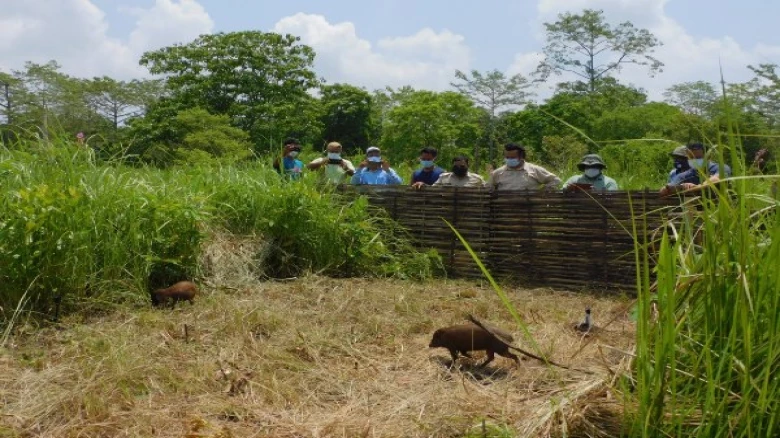The PHCP has successfully raised and reintroduced 170 hogs in Assam to date, and the most recent release...
Digital Desk: On Saturday, eighteen captive-bred pygmy hogs were released into Assam's Manas National area, marking the fourth time the highly endangered species has been returned to the area since 2020.
The Pygmy Hog Conservation Programme (PHCP) is a partnership between the Durrell Wildlife Conservation Trust, the IUCN/SSC Wild Pig Specialist Group, the Assam Forest Department, the Ministry of Environment and Forests, and Aaranyak.
The PHCP has successfully raised and reintroduced 170 hogs in Assam to date, and the most recent release raises the total number of pygmy hogs in Manas National Park to 54. This means that the PHCP is on track to accomplish its goal of releasing 60 pigs into the park by 2025.
"The results of the Orang camera trap and sign surveys demonstrate the real impact that our captive breeding and release programmes can have in saving species from extinction," stated Dr. Parag Jyoti Deka, Project Director of the PHCP.
"With the inspirational dedication of the Durrell team, and with the support of our partners Aaranyak and Assam Forest Department in Assam, we have been able to restore a self-sustaining population of pygmy hogs, bringing back an integral part of the ecosystem of the grasslands of Orang National Park," Deka stated.
Some of the largest remnant grassland blocks in the sub-Himalayan grassland ecosystems can be found in Manas National Park. "I am happy to welcome the release of more pygmy hogs to their original home, stated Manas Field Director Rajen Choudhury. It will aid in the rewilding of Manas' grasslands and restore its splendour."
After their release, the PHCP will continue to monitor the pygmy hogs with video traps and sign surveys. In addition, eight of the hogs will be radio-tracked for four years to collect data on their behaviour and habitat utilisation.

Leave A Comment